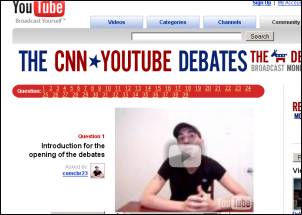Wednesday, July 25, 2007
CNN/ YouTube Debate Responses Live
The CNN/ YouTube debates allowed people to upload video questions, which were then presented to Democratic candidates in the US presidential campaign for 2008. The responses have now been added to the site. The Republicans will be questioned later, on September 17th.
First of all I was curious why there are only two parties represented in these debates. Seth Finkelstein of the Infothought blog explained to me:
The way the US system is set up, the two major parties (Democratic and Republican) are the only ones which matter in almost all the cases. It’s not like European Parliaments. Other parties exist, but are almost never of any significance, typically only in terms of when the margin of victory between the Democrat and Republican is so close that a third candidate drains important support from one and so helps the other to win. The most notable recent example is when Ralph Nader ran for President in 2000 as the Green Party candidate. He got 2.74% of the vote, but many people think he took enough support from Al Gore so as to throw the election to George Bush.
Now, opinions on this debate’s effectiveness differ. It was certainly an event promoting both CNN (which gets a more modern, tech-friendly image) and Google-owned YouTube (which gets even more mainstream exposure – not that they didn’t have a lot in the past already – and might also be taken more serious). But was it also constructive in political terms? CNN themselves called this “unscripted” and coming from “real people.” In their report they recap:
The lights and cameras were focused on the eight candidates, but it was the personal, heartfelt and, at times, comical nature of the user questions that stole the spotlight.
Questions included one from a father who lost a son in Iraq and wondered if he would lose another, a gay couple asking why they shouldn’t be allowed to marry and a woman stricken with breast cancer who asked if her chance of survival would be better if she had health insurance.
In all, 39 questions were asked from the 3,000 submissions YouTube said it received.
Most observers agreed that none of the candidates debating at The Citadel in Charleston, South Carolina, particularly outshone their rivals, doing nothing to challenge Sen. Hillary Clinton’s position as the Democratic race’s front-runner.
Jeff Jarvis of Buzzmachine.com on YouTube debates on Monday wrote:
The YouTube debates could fundamentally change the dynamics of politics in America, giving a voice to the people, letting us be heard by the powerful and the public, enabling us to coalesce around our interests and needs, and even teaching reporters who are supposed to ask questions in our stead how they should really do it.
Jeff goes on for a bit but then disclaims:
All this could happen. Or CNN could pick the dutiful, dull, obvious, sophomoric questions and make us look like a nation of dolts. I hope that won’t be the case; I don’t think it will. Yet CNN did give itself too much control and responsibility when it decided to single-handedly choose all our questions. They should have enabled us to select at least some of the questions and to rate, categorize, organize, and comment on them. At the very least, CNN should have asked us what we think about their choices. Not allowing that still indicates a lack of trust in us, the electorate. CNN shouldn’t be controlling this. They should be organizing it.
Shelley Powers from the Burningbird blog voiced even stronger criticism in response to Jeff, saying:
Many of the questions I saw at YouTube are questions from people who see this as another opportunity for 15 seconds of attention. These are questions from people pushing a message, even a worthwhile one such as those related to Darfur. In the cases where a person adds a minimum of embellishment to the message, the questions are little different from previous debates: health care, ending the war in Iraq, what do you think about Bush? Immigration? Oil companies? Nuclear power and who should, and should not, have it? Gun control? Homeland Security? Torture in other countries? Torture in our country? Women? Minorities? What are you going to do about the environment?
Of course, all of these can be answered succinctly in 90 seconds or less.
As for these being questions from ’average’ people, I find this unlikely. Leaving aside the skewed age demographic, these aren’t questions from people too poor to have the computer equipment. These aren’t questions from people who work two jobs, just to make ends meet and who don’t have the time to create such videos.
Shelley goes on to say that CNN is filtering the questions and therefore doubts that “tough questions” make it through. “This isn’t politics, this is entertainment,” she concludes, “All that’s different from entertainment offerings in the past is we’ve exchanged the Ziegfield girls for YouTube sock puppets.”
Well, now that the responses are in, Jeff Jarvis too posted an update. “I am sorely disappointed,” he says in his blog. “CNN selected too many obvious, dutiful, silly questions. ... The candidates gave us the same answers they always give. ... I have no doubt – no doubt – that we, the people, would have done a better job picking the questions than CNN did.”
CNN in their report however argue, “Though CNN vetted the questions, it was the first time that a journalist or a professional has not dictated what is asked of the candidates.”
[Thanks Seth!]
>> More posts
Advertisement
This site unofficially covers Google™ and more with some rights reserved. Join our forum!

